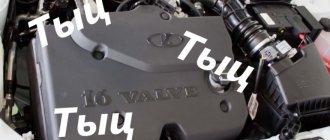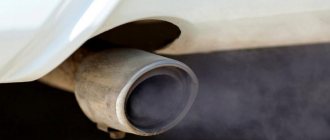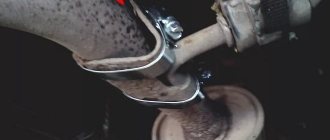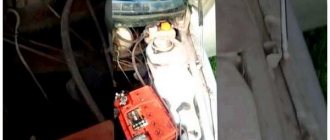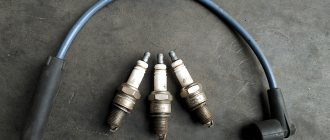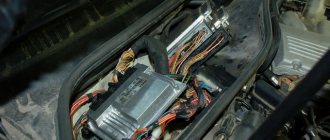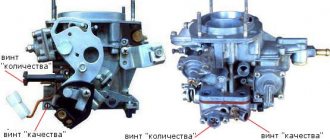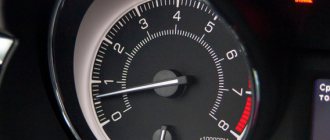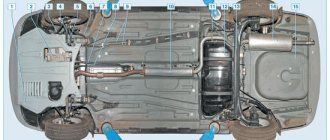Popping sounds in the muffler when starting the engine, when pressing and releasing the gas, idling or when braking the engine are common phenomena that many car owners encounter.
Such a problem may indicate an engine malfunction, problems in ignition settings, or timing malfunctions.
If a breakdown is identified, it is important to fix it to avoid even more serious problems.
The article discusses the main causes of muffler pops, which are typical for most car brands. Then we will dwell in more detail on the models VAZ 2106, VAZ 2109, VAZ 2114, VAZ 2115 injector, UAZ, GAZelle and cars with ZMZ 402 engines.
When the silencer is fired
The main reason for “shooting” at the muffler can be called incomplete combustion of the working mixture in the combustion chamber.
Next, the fuel-air composition explodes inside the intake mechanism due to heating to high temperatures. As a result, a strange sound similar to cotton appears.
This malfunction can occur in any engine - with an injector and a carburetor, regardless of the type of fuel used. One of the reasons is considered to be a phase mismatch of the timing mechanism.
But this is only one of the options. A range of work may be required to identify and eliminate the malfunction.
Can a bang in the muffler damage the engine?
Shots in the exhaust system are considered a consequence of failures in engine adjustment and a violation of its settings.
This indicates the need to check three systems - ignition, timing and fuel supply.
If you delay repairs, there is a high risk of engine damage.
Untimely restoration can lead to damage to the integrity of the valves, malfunction of the exhaust system, and even a car fire.
The only positive aspect of “sneezing” is the ability to detect a malfunction in advance and take action.
During the repair process, a comprehensive check of the internal combustion engine, adjustments and installation of new consumables are often necessary.
Popping sounds from cars on gas
The problem also occurs in cars with gas equipment that use liquefied gas as fuel. Moreover, according to statistics, this situation is widespread.
Popping noises appear both in the mufflers (and in the exhaust system in general) and in the intake manifold. Two main reasons for the problem:
- Insufficient or unstable gas supply. This happens if the gearbox is incorrectly configured or the filter is clogged. Sometimes the culprit is the MAF (mass air flow sensor), present in fuel-injected cars.
- Incorrect ignition angle. With early ignition, the filter or manifold will shoot, with late ignition the muffler.
Whatever car you use - carburetor, injection, LPG - always monitor the basic settings of all systems. Do not neglect regular vehicle inspections and always pay attention to the first signs of problems. Our company will help with both preventive measures and repair or replacement of the muffler.
Checking the carburetor and air filter
It is not always possible to figure out why shots appear in a silencer. The first assumption that car owners make is that the timing belt is malfunctioning. But the reasons may be different.
Before starting work and checking the engine, it is worth understanding the principles of this phenomenon.
An explosion in the exhaust pipe is evidence of combustion of the fuel mixture outside the combustion chamber.
The first thing to start with is to check the condition and correct settings of the carburetor, as well as the air filter.
Practice shows that a fuel mixture that is too rich does not burn completely, and its remains end up in the exhaust manifold, and then in the muffler.
The existing temperature in the duct is sufficient for the finished mixture to ignite with the appearance of a characteristic pop.
In such cases it is recommended:
- Remove the air filter and replace the internal filter element.
- Check the fuel supply adjustment in the carburetor.
avtoexperts.ru
The main, most common causes of malfunction are problems with valve timing, fuel supply or ignition systems.
Popping noises can occur during various operating modes of the power plant, namely:
• When starting the power plant;
• At idle;
• During transient conditions;
• When releasing gas.
Why does the muffler shoot?
The main reason is unburnt fuel that got into the muffler and ignited in it. The louder the “shot” will be, the more fuel has accumulated in the exhaust pipe.
Fuel entering the exhaust system is caused by the following:
• Malfunction of fuel system elements;
• Valve timing failure;
• Violation of valve clearances;
• Carbon formation on exhaust valve plates or valve seats;
• Stuck or burnt out exhaust valve;
Supply system
Malfunctions of the fuel system are expressed in the incorrect dosage of the mixture by the carburetor due to contamination of the jets, an increased level of fuel in the float chamber, which causes an over-enrichment of the fuel mixture and, as a result, its incomplete combustion. In this case, part of the unburnt fuel enters the exhaust manifold during the exhaust stroke.
A rich mixture can also form due to a malfunction of the injector nozzles, which produce an unmetered portion of gasoline, some of which also ends up in the muffler without burning. A clogged air filter also contributes to fuel enrichment, when it is no longer able to pass the amount of air necessary to form the mixture.
If the valve timing is violated, the exhaust valves open earlier than the specified moment and part of the unburned fuel is pushed into the exhaust system.
Valve mechanism
When the prescribed gap decreases, the valve cannot “sit” tightly in the seat and part of the mixture breaks into the muffler; the same thing is observed when carbon deposits form on parts of the valve, as well as when it hangs in the guide sleeve.
When the exhaust valve plate burns out, a looseness appears in the connection and during the compression stroke, part of the fuel is also pushed into the muffler.
Ignition system
Late ignition also causes popping noises in the muffler. This is caused by the fact that the mixture is already compressed and the piston begins to reverse and only then does a spark jump out, which leads to incomplete combustion of the fuel, some of which enters the muffler, where it ignites and burns in the form of a loud bang.
Late ignition not only provokes shots in the exhaust gas system, violating the integrity of its elements, but also contributes to burnout of the exhaust valve plates, which will require further engine repair.
The fuel may not burn completely due to misfires in individual cylinders, or a weak spark, which in turn is associated with a malfunction of the distributor, ignition module, high-voltage wires or spark plugs.
Injection engines
The occurrence of shots in the muffler in engines with an injector is caused, in addition to the reasons listed above, also by a malfunction of various sensors. Thus, the operation of the engine is controlled by an electronic unit that receives information from sensors, the failure of which leads to errors in control and incorrect formation of the fuel mixture, causing it to become over-rich.
A faulty knock sensor can cause late ignition.
Engines equipped with a gas installation
Shots in the exhaust system on engines running on gas are caused by the following reasons:
The influence of thermal clearance on popping noises in the engine
When malfunctions occur in the engine and the first explosions in the muffler, car owners test the car under various loads.
Thus, the appearance of popping noises at any speed (high, medium and low) may indicate failures in adjusting the thermal clearance of the cylinder head valves.
The solution is to disassemble the motor and use a tuning tool. After performing the check, you can draw conclusions about the causes of the problem.
The camshaft cams and tappets should have a small gap where they touch the valve stem.
After heating, the metal parts increase in size and the gap decreases.
If the adjustment is made correctly, the valves completely close the gap, and if this parameter is violated, a gap remains through which the mixture exits into the exhaust manifold.
The result is the ignition of unburned fuel in the engine. To “treat” popping noises, it is necessary to adjust the cylinder head valve clearance. It is also important to pay attention to the color of the smoke from the exhaust pipe.
Ignition retard
Loud shots from the muffler are also caused by an ignition problem, or more precisely, an incorrectly set advance angle. If the spark plug fires later than required, then sounds from the muffler may appear even “when it’s cold,” that is, when the engine is started directly. The reason is simple: in this case, ignition occurs at the moment the intake valve opens, which will lead to the unfortunate entry of the combustible mixture into the intake manifold.
Important: do not ignore this problem and immediately contact a service station, because prolonged operation of the engine with an incorrect ignition timing can lead to burnout of the exhaust pipe and even the valve.
The following situation is also possible: the ignition angles are set correctly, but the pops still do not disappear. In this case, you should look for the problem in the spark plugs and wiring. It also wouldn’t hurt to check all the toggle switches and contact groups. In rare cases, this may be caused by installing a spark plug with the wrong heat rating.
Ignition timing
Now let's figure out how late ignition affects it.
Another reason that fuel explodes in the muffler is due to ignition problems.
To confirm or exclude this assumption, it is necessary to check the correct setting of the timing in the ignition system. If the latter is set up late, shots cannot be avoided.
This is due to the fact that the spark fires with a delay, already at the moment the exhaust valve opens. As a result, a certain volume of fuel ends up in the collector.
If you ignore the problem, there is a high risk of burning out the valves and exhaust pipe.
If there are no problems with the ignition, and it is configured correctly, shots still appear at the moment of starting or driving.
The reasons may be the following:
- Weak spark;
- Poor wire contacts;
- Fault in the toggle switch or contact group.
One of the reasons for the deterioration in spark quality is a problem with the spark plugs, so you need to unscrew each of them one by one and check the quality of the contacts.
The muffler may still fire due to an incorrectly selected spark plug heat rating.
Causes of popping
To successfully identify and correct such malfunctions, it is necessary to understand the origin of the shots. The popping sound occurs from improper combustion of fuel and is formed in two ways:
- In a combustion chamber filled with a combustible mixture, ignition occurred from a spark plug when the exhaust valve was open.
- Some of the unburned fuel penetrated the exhaust manifold and was ignited by hot gases emerging from the adjacent cylinder in the next cycle.
Note. Diesel engines also sometimes “sneeze”. Unlike gasoline engines, the shot is formed only in the combustion chamber (first option).
Shooting in an exhaust pipe is an unpleasant phenomenon and fraught with consequences. Micro-explosions often lead to the destruction of exhaust gas release elements - the resonator, muffler and expensive catalytic converter. Further neglect will lead to accelerated burnout of the valves. If your car starts making popping sounds or loud banging noises, it is recommended that you find and fix the problem as soon as possible.
In engines where the air-fuel mixture is prepared by a carburetor, the reason for the appearance of popping sounds lies in one of three main systems:
- ignition;
- fuel supply;
- gas distribution mechanism.
The order of systems in the list is not random. Such problems are most often caused by faulty parts of the ignition system, less often by the carburetor and timing belt. Severely worn engines may “sneeze” due to loose valves, but this is already a matter of major overhaul. Each group of problems should be considered separately.
Ignition faults
Problems in the spark generation system provoke the occurrence of 2 types of pops: back into the carburetor or into the muffler. The phenomenon is explained simply: in the first case, the spark on the spark plug jumps too early, when the intake valve has not yet closed (pre-ignition), causing the ignition in the chamber to spread to the manifold and carburetor.
The second case is ignition too late: the fuel flashes simultaneously with the opening of the exhaust valve.
Both early and late sparking occurs for the following reasons:
- in the main ignition distributor (distributor), the “runner” has failed - an element that alternately transmits a spark to the cylinders through high-voltage wires;
- in the same place - the Hall sensor has moved or become unusable;
- in a distributor with a cam (mechanical) breaker, the contacts are burnt or the bearing is worn out;
- crack in the distributor cap;
- the capacitor stopped working normally;
- The ignition timing is set incorrectly.
Note. The advance angle is often violated during the repair process when the car owner needed to remove the distributor. Another reason is spontaneous shift due to vibration (the clamping nut is not tightened too well).
A sign of these problems is a shot in the carburetor or exhaust pipe when you press the gas. At idle speed the engine will not “sneeze”, although unstable operation with such a malfunction is guaranteed.
The best way to quickly find the root of the problem is to temporarily change the source of trouble - the main ignition distributor and check the performance of the engine in all modes. If there is no spare distributor, you will have to go through the list and check each part separately. Start by adjusting the lead angle.
Fuel system overflow
When the carburetor supplies too much fuel - “overfills”, the air-fuel mixture partially enters the exhaust manifold, causing the engine to shoot into the exhaust pipe. Often, a problem is detected by a strong smell of gasoline, which can be heard in the engine compartment and inside the car. The second sign is the electrodes of the spark plugs, covered with black soot. The third marker is smoke from the exhaust tract, colored black, sometimes mixed with soot.
Reasons causing carburetor overflow and popping noises:
- a completely clogged air filter causes the engine to draw in more fuel;
- the needle valve in the carburetor float chamber has lost its tightness;
- In the same place - a rupture of the membrane of the accelerator or economizer pump, jamming of the dampers in the slightly open position.
The supply of a large amount of gasoline is accompanied by a “floating” idle speed or an increase to 2000-2500 rpm. Shots can also be heard while driving, when the driver sharply releases the accelerator pedal, continuing to coast while the speed is on.
Problems with the gas distribution mechanism
Violation of the valve timing causes the muffler to fire on all types of engines - carburetor, injection and diesel. The malfunction is accompanied by a drop in power of the power unit, unstable idling and loss of acceleration dynamics. Sometimes the speed “floats” from 500 to 2000 rpm, and when you try to press the gas pedal sharply, a shot is heard.
When the phases of gas distribution shift, a spark flashes in the cylinder when the valve is open - intake or exhaust. There are three reasons for the malfunction:
- The timing chain or belt has jumped 1 tooth;
- excessive stretching and sagging of the timing belt;
- incorrect adjustment of the gas distribution mechanism after disassembling and repairing the engine.
The problem is detected as follows: by turning the crankshaft, the mark on the pulley is aligned with the mark on the cylinder block.
In this case, the mark on the camshaft gear should be opposite the other marks on the housing. If there is a mismatch, the phases are out of order and the relative position of the shafts must be corrected. Quiet popping noises in the muffler at idle speed indicate small thermal gaps between the camshaft cams and valve rocker arms. Moreover, “when cold” the shots are not heard and appear after warming up to operating temperature.
Checking the spark plug wires
When servicing a car, car owners are often forced to remove high-voltage wires to twist and check spark plugs.
Subsequently, the products can be put into place without checking the correct connection.
This approach is dangerous, because mixed up wires lead to unpleasant consequences - instability of the motor and popping noises.
If, when you first try to start the engine, shots appear in the muffler, this is a reason to check the correct location of the cords.
Also read why spark plugs turn black.
Timing belt slipped
If the exhaust system starts shooting, you can’t dismiss problems with the timing belt.
As noted, one of the reasons for such a malfunction is malfunctions in the gas distribution mechanism.
As a result, the exhaust valve opens before the fuel has time to burn, and the remaining fuel burns out in the exhaust pipe.
The likely cause of such failures is stretching and slipping of the timing belt.
If shots in the muffler occur only on a warm engine, but not on a cold engine, we can confidently talk about problems in the timing belt.
The engine fires into the muffler (pops). Why? Let's disassemble the injector and carburetor
Shots occurring in the exhaust system are a sure sign of a malfunction in the vehicle’s power unit.
Most often, a similar problem occurs in the case of carburetor engines and is associated with malfunctions of the ignition or gas distribution mechanism. But sometimes the muffler and injection-type power plant shoots. THE CONTENT OF THE ARTICLE
To be honest, guys, this is another reason not to like the carburetor engine, because there were quite frequent fuel overflows, and accordingly after popping, but this is only one of the reasons, in fact there are many of them.
Shoots into the muffler when releasing gas
Another situation is when popping noises appear when the gas pedal is released. How does the malfunction manifest itself?
At idle speed and when the gas pedal is pressed, the engine runs normally, but just release the pedal, and explosions are heard in the muffler area.
In this case, the engine continues to work and does not stall, and the traction remains at a high level. The only thing that changes is the XX “floats”. What to do in such a situation?
The main reason is the combustion of the combustible mixture outside the cylinder, and this is caused by the following:
- Low quality atomizers that do not spray fuel, but direct a stream into the combustion chamber.
- Low oxygen level in fuel. In this case, gasoline does not burn completely. In such a situation, it is important to control fuel consumption. If it has grown, you need to change the air filter and check the operation of the air damper.
- Excessive fuel supply is set.
Consequences of claps and shots
If you hear a pop when you sharply press the accelerator pedal, then you should definitely expect unpleasant surprises.
Among the consequences are increased fuel consumption and engine overheating. The motor in this condition will not develop full power. You shouldn't count on smooth idling either. Starting the engine is very difficult and sometimes almost impossible.
If the carburetor slams, then the engine response to the gas pedal is inadequate. All fine tuning of the motor and each of its systems is lost. These moments are often accompanied by failures and delays in response to pressing the gas. At the same time, the car moves jerkily, twitches in load mode and in transient modes. The engine will sneeze and stall.
The car won't start
Another problem that car owners face is shots in the muffler at the time of start-up.
The situation looks like this. The driver tries to start the car, starting does not happen, but there are quiet shots in the exhaust system.
If nothing is done, the next attempt may be fatal for the muffler - there is a high risk of damage due to an explosion.
In such a situation it is worth:
- Inspect and replace spark plugs if the electrodes are dirty.
- Assess the condition of the timing belt and, if necessary, tighten it or change it.
- Check the crankshaft position sensor and replace it (if it fails).
- Measure the pressure in the fuel line. If it is below three, the pump needs to be replaced.
- Check the compression in the engine. One of the reasons why the muffler shoots is because the rings are stuck. One option is to drain the oil and fill the cylinders with kerosene. After this, you need to twist the spark plugs and turn the starter. The machine must stand, then the kerosene is drained and oil is added. Now you can try to start the engine again.
- Disconnect the DTOZh sensor and start the engine with the device turned off. This action allows you to more accurately determine the cause.
If the car is of injection type
If a problem occurs on the injector, you should carefully check the sensors.
This problem did not escape the injector either. In this case, most often the problem lies in the failure of the sensors, because they play the main role on such cars. First of all, you need to check the air intake sensor. The next step of testing will be the crankshaft position sensor. If the belt moves by one tooth, the entire gas distribution system will fail. It is unlikely that you will be able to conduct a quality check of the entire electronic circuit on your own. You need to get to a qualified computer diagnostic center. A competent specialist will quickly find the weak link. All that remains is to purchase and replace the broken part, and the car will work like a clock again, delighting its owner.
Popping sounds in the injector - reasons
There is an opinion that shots in the muffler are a problem only with carburetor engines. This is wrong.
The injector is also not ideal, and the cause of “firing” may be a malfunction in the ignition circuit or in the thermal clearance of the valves.
In addition, it is possible that the contacts of the sensors may be damaged, because in the event of such a breakdown, erroneous data is supplied to the control device, and the ECU does not manage fuel correctly.
To determine the cause, detailed diagnostics of the machine is necessary.
What to do if the muffler of an injection engine shoots? Service station technicians assure that in such a situation it is important to contact specialists.
Otherwise there is a high risk of damage to the engine or muffler.
If we talk about the most common causes of malfunction, the problem may be hidden in the belt stretching or a tooth skipping.
Popping sounds in mufflers during HBO
After installing LPG, car owners may experience “shooting” in the exhaust system.
The main reason is gas supply failures, which are caused by incorrect settings of the gearbox or dirty air filter.
In addition, the cause of the malfunction may be the failure of the DPKV, so it is also worth checking. As a result, the mixture turns out to be too “poor” or “rich”.
As in the case of a gasoline engine, explosions of unburned gas can cause a number of malfunctions - damage to the air filter, failure of the mass air flow sensor, rupture of the muffler and destruction of the engine valves.
In the most difficult cases, a fuel fire under the hood may occur.
To eliminate problems during the installation of gas equipment, it is important to fine-tune the ignition system and maintain it in perfect condition.
Before installing gas equipment, the ignition system must be configured. The condition of the air filter is of key importance, and it is recommended to update it taking into account the manufacturer's recommendations.
Also, after installing the LPG, it is necessary to set the correct advance angle using a special octane corrector.
What to do if the silencer is already firing? In such a situation, there are three steps to take:
- Adjust the valves;
- Adjust the ignition;
- Carry out preventive measures in relation to the gearbox.
Diesel and injector shots
In old-style diesel power units, the timing of diesel injection could be manually adjusted mechanically. If the settings were incorrect, the fuel was compressed too late and the diesel engine “sneezed” with white smoke. Nowadays, injection and diesel engines are controlled electronically, so firing from a muffler has become a rarity.
The main reasons why popping noises occur in modern engines:
- failure of one of the main sensors - mass air flow sensor, DBP, lambda probe or throttle position;
- severe contamination of the working surface of the crankshaft position sensor with metal shavings;
- problems in the high-voltage ignition unit;
- accumulated controller errors.
Advice. Electronics diagnostics is a complex issue that must be resolved by service station technicians. But you can reset the errors by disconnecting the battery for 15 minutes. Often, engine operation is improved in this way, but a check at a car service is still necessary.
When the power unit shoots into the muffler when releasing gas, the culprit may be automotive gas equipment. The installation that supplies liquefied propane to the cylinders is controlled by its own electronic unit and, in addition to the cylinder, includes valves with a reducer. If, as a result of a malfunction, the system begins to “overflow” gas, shots are inevitable. Such equipment should be handled by specialists; independent repairs are not allowed.
